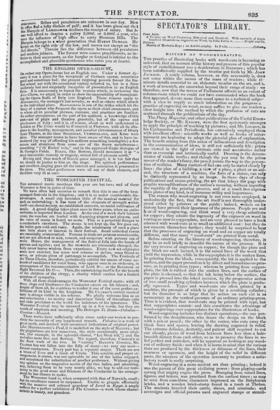THE 'WORCES'PER. FESTIVAL.
Tim autumnal music meetings this year are but two; and of these Worcester is first in point of time.
We have often had occasion to' remark that this is one of the best- maneged festivals in the kingdom ; and it is so under considerable dis- adVantages. A small city furnishes little of the musical materiel for such an undertaking : it has none of the elements of strength within itself—no choral society, no established concerts, no social cultivation of
music. A grand display takes place once in three years, when an entire orchestra is imported from London. At the end of a week their labours cease, the coaches arc loaded with departing singers and players, and the voice of music is heard no more. This is a perpetual damper to a conductor's exertions. The steam is not kept up, the fire goes out, the boiler gets cold and rusty. Again, the inhabitants of such a place take little share or interest in their festival. Small cathedral towns are essentially aristocratical. Persons in trade are persons unnoticeable, and are not allowed to mix, consult, and coilperate with persons out of trade. Hence, the management of the festival falls into the hands of parsons and squires; and as the stewards are triennially changed, the body never learns wisdom from experience. Every new set originates some new crotchet, has some new scheme or device, some friend to serve, or private piece of patronage to accomplish. The Festivals of the Three Choirs, therefore, periodically exhibit the names of some un- heard-of candidates for vocal fame, who appear once in an orchestra, in
consequence of the recommendation of Lord or the Reverend (Sr Right Reverend Dr. C—. Then, the undertaking itself is for the benefit of the children of the clergy, a charity which excites but a limited quantum of sympathy.
With all these disadvantages the Worcester Festival starts ; with all these clogs and hindrances the Conductor enters on his labours ; and, despite of them all, he contrives to render it one of the most perfect ex- hibitions of its kind in the kingdom. Mr. CLARKE'S correct musical taste is always visible in his scheme. We gladly welcome him as an anti-selectionist : no motley and discordant fabric of threadbare odds and ends proclaims to the world his indolence or bus ignorance. The Worcester Festival may be summed up in a few words, but they are words of emphasis and meaning, 7'he Lettingen Te Deum—Palestine- Creation—Messiah.
These works have sufficiently often come under our review to pre- clude the necessity of any lengthened remark. l'alestine is a work of great merit, and marked with occasional indications of original power. Like 3IENDELSSOIIN'S Pad, it is modelled on the style of HANDEL ; hat the plagiarisms are less numerous, the style occasionally more origi- nal, (for example, in the splendid chorus, "Let Sinai tell,") and the melodies more free and flowing. We regard, therefore, Cmyren's us the finer work of the two. In "casting" Haviss's Creation, Mr. CLARKE has not fallen into the folly of ninny—we may say most— former conductors. Every part has a separate singer. There are not a brace of Eves and a leash of Uriels. This sensible and proper ar- rangement, it seems, was not agreeable to one of the ladies engaged, and occasioned the substitution of another performer. Without giving any opinion on the respective merits of the two ladies, and admitting, nay, believing them to be very nearly alike, we beg to add our testi- mony to the good sense and firmness of the Conductor in the arrange- ment he has chosen to make. The Worcester band is, when compared with that of Norwich, small ; but its excellence cannot be surpassed. Unable to grapple effectually with the massive and colossal grandeur of Israel in Egypt, it amply .atIces for a perfect exhibition of The Creation—a work whose charac- teristic is beauty, not grandeur.


























 Previous page
Previous page